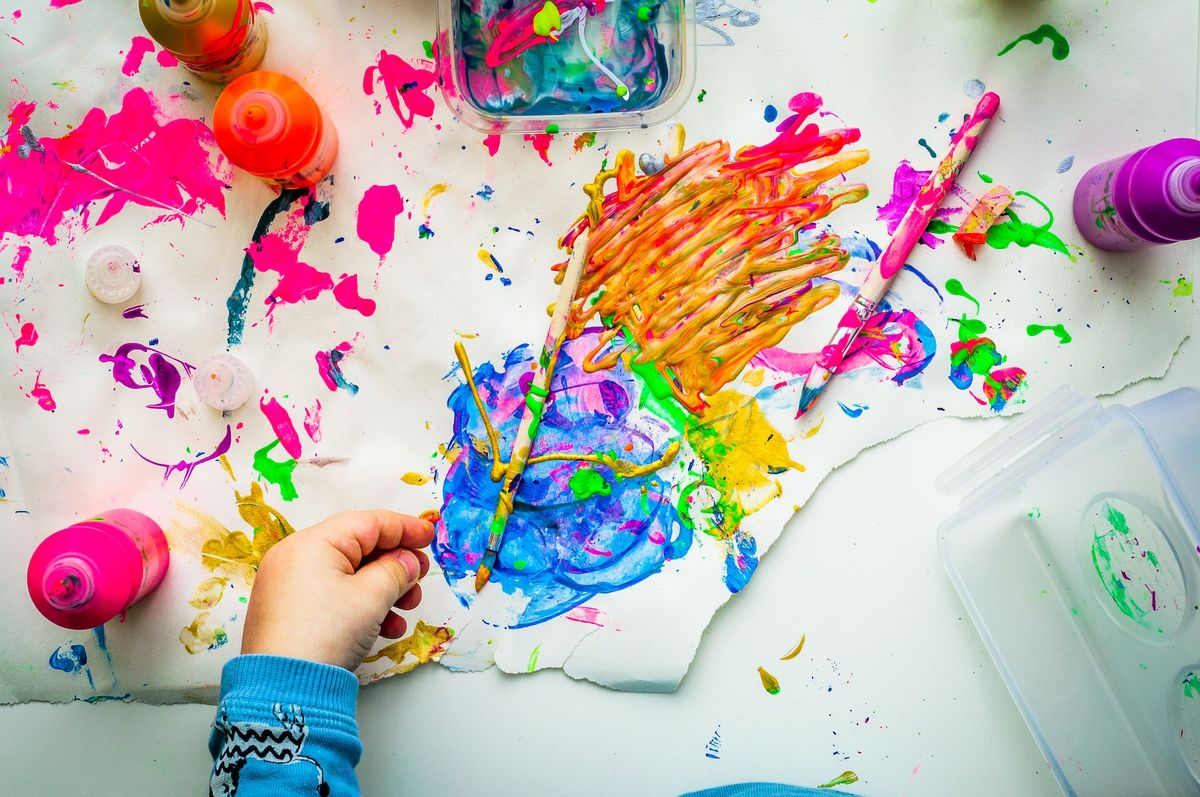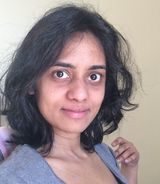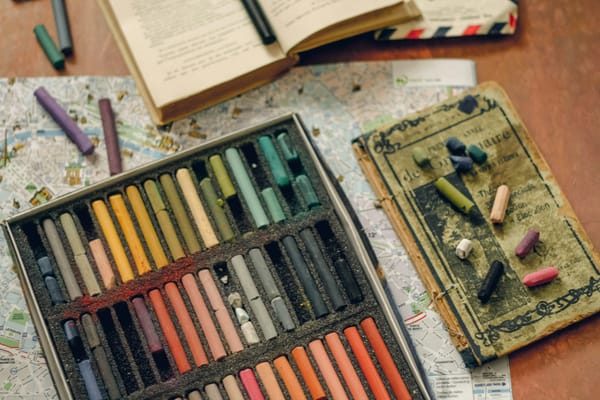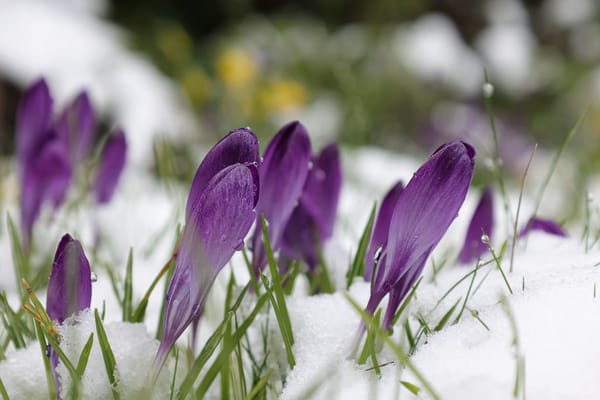(day 25): redefining my creative life
Taking stock of my creative ambitions and fitting them within the realities of my life, rather than the other way round.

After dropping D at school, I made my way to the library this morning.
And there, in that familiar nook that I hadn't been to in a long time, I was finally able to open the manuscript on which progress had been stalled for several months and start going through it to reacquaint myself with the characters and their stories.
I don't quite remember when I had stopped going to the library to work or what excuses I made to slip out of that habit.
But much drama ensued yesterday (Monday) morning, and I've had to take stock of who I'm becoming on the pretext of creating art. As Rachel Friedman puts it in her book, And Then We Grew Up, I had become an art monster.
On being an 'Art Monster' and the anxieties that are feeding it
For you see, after several days of not writing fiction and generally mucking about, I had decided over the weekend that I'd spend this week tackling the manuscript that I've been struggling with for a very long time. A look at the document shows me that I've been working on it on and off since last October.
I've tried every single trick in the book to get unstuck. Taking the Write Better-Faster 101 workshop by Becca Syme hoping it would help me figure out how to tap into my unique Strengths as a writer. Taking the Depth in Writing workshop on craft by Dean Wesley Smith to give myself some impetus to get back into writing fiction.
I learnt a lot, including the truth that I seem to like throwing away money that I don't have to take advice from others that I don't intend to implement anyway.
I really love the story, so I have no idea why I've been so stuck in that manuscript for so long.
Anxiety got the better of me on Monday morning. Simply opening up the document sent me into a tizzy, and I became an art monster. The kind who snapped at D because he was being himself, a 6-year-old who wanted to spend time with his mother before leaving for school. The kind who yelled at KrA because if only he had been a more supportive partner, I could have written countless books and won the Pulitzer or become a New York Times bestselling author by now.
And after KrA left to drop off D at school, I made the mistake of going online and looking up the usual websites I follow to stay updated on the publishing industry.
In her latest podcast, Joanna Penn talked about how Michael Anderle, author, publisher, and one of the co-founders of the 20BooksTo50K group on FaceBook had changed his publishing plans for 2023 based on the newfound access the whole world has gained to ChatGPT and other AI tools.
Apparently, Anderle's publishing house had published 350 books last year (he works with a number of writers), and he was aiming to double that output to 700 books this year.
But now, with access to ChatGPT and the ease with which content, including novels, can be generated, he is eyeing an output of 10,000 books this year.
Yes, there is no typo there! 10,000 books. That number is staggering.
True, Anderle has a crew of writers to work with so he isn't going to be a lone wolf cranking out 30 books/day using ChatGPT.
Still, it goes to show the immense possibilities that AI offers, and while I'm not at all anti-AI, I do worry about what these changes would mean for someone like me who likes to sit and type words and string them to form a story.
The process of writing a story is so enjoyable for me and I've resisted attempts to co-write with human authors before, so I don't know how I feel about co-writing with a tool.
I have played around with ChatGPT to create initial versions of blurbs for a couple of books, which proved great starting points for me to flesh out the final blurb.
But when it comes to writing a story, I love typing out what the characters are saying or doing or sensing or thinking or feeling. I love discovering the unexpected twists and turns a story takes. And I absolutely love the state of flow I sometimes get into when a story is chugging along really well.
But if the market is going to be flooded with books, and who's to say it's not already saturated, then I have to start asking myself the question, "What's the point of it all?"
What's the point of writing if I can't find readers at the end of the day to sustain my practice?
And in a fit of rage, I took my handwritten notes on the story and ripped them into pieces so tiny that there'd be no possibility of salvaging them at all. We've already emptied our garbage bins at home into the communal bin outside, so those bits of paper and the words written on them are gone forever.
That's OK. I reckon I needed a fresh start on the story, which I managed to get today when I headed to the library and started going through what I've written so far and taking notes on them.
But I'm jumping ahead, because I first needed to take stock of who I was becoming in this pursuit of making a living from writing fiction, and how to follow a creative passion without going insane in the process.
Deciding what creativity means to me
In her podcast, Joanna Penn talked about how the business model that Michael Anderle intends to pursue is not one that entices her, not that there's anything wrong with it, but just that she chooses to follow the path of being an AI-assisted artisan author instead.
I was so anxious after hearing that news that I promptly wrote to Dean Wesley Smith asking for some words of wisdom. Dean has been extremely clear on his stance on AI right from the beginning and he is taking a wait-and-watch attitude till the dust settles on copyright and other legal issues pertaining to AI right now.
I remember from the Critical Voice workshop I had taken from Dean about a year ago that when we write a book, it's best to be process-focussed. And only when it is time to sell a book, do we need to become product-focussed.
If we become product-focussed when we are in the thick of writing a story, that influences the story in all sorts of unwanted ways. For instance, we might foresake an original ending in favour of something we believe the market would like better.
Thinking on these lines made it easier for me to accept that I quite love writing stories, I love writing these blog posts, and because I enjoy the process itself so much, despite the frustrations and challenges that come along with it, there is little benefit for me in outsourcing the process to another human or an AI tool.
What bothers me in the whole scenario is the possibility that I may not earn a living writing fiction, or rather, a lucrative income is not guaranteed, because there are far too many factors outside of my control for anyone to say with any measure of certainty that I'd have a million bucks in my bank account in five years from now. Ain't that the dream?!
After doing some soul-searching, largely in part due to having read Rachel Friedman's And Then We Grew Up recently and now re-reading it, I've come to admit that this whole endeavour of making a living writing fiction was stalling me in my tracks.
I had put conditions on my creativity to be financially viable, wildly lucrative even, and that too as of yesterday. No wonder the muse had turned away, disappointed and likely feeling threatened.
I know I don't like to deliver when demands are placed on me without faith; I know I deliver a lot more when the recipient doesn't even feel the need to ask.
I can completely understand if my muse is like that too.
When I first read Friedman's book, I promptly concluded that I should give up trying to make a living as a fiction author and focus on getting a real job in the real world instead.
A few days after that, I tottered towards the other end of the spectrum and decided that ambition was not a bad thing, and that I needed to be ambitious and go after lofty goals.
Now that I have teeter-tottered between wanting it all and wanting nothing at all, I have come to adopt a more balanced and nuanced view.
I love writing, yes, but I do not wish to pursue it with some kind of crazed passion that turns me into an art monster, one who hates being a mother and hates doing grown-up things like filing taxes or cooking food.
Instead, the simplest and most sustainable practice I can keep up with is this:
- When D is at school, I'll go to the library in the mornings to write fiction for an hour. That's it. That's all I ask of myself. The rest of the day, I will leave it open for adulting and also for writing and other publishing-related work as I'm able to do.
- When D is at home, whether on weekends or before or after school or during school breaks, I'll spend that time with him without worrying about all the writing I believe I could be doing, should be doing, even though in an alternate D-less Universe, I'm sure I'd have been squandering all that time complaining about something else altogether.
That's all.
I don't wish to have any crazy wordcount goals to chase. I've noticed that when the going gets good, when I get into a habit of writing daily, that's when ambition raises it head and starts telling me that I should be doing more, and that I could be doing more if only KrA would do more (he'd need to clone himself for this) or D would be more independent.
Rubbish!
This kind of thinking has only filled me with resentment and completely clouded my view of what life is. Surely, this is some kind of self-sabotage!
Of course, there may be businesswomen who are able to rope in their moms or mothers-in-law to look after their kids while they focus on their business. Or perhaps they get by with 3 hours of sleep and are completely functional despite that.
I have to take a realistic assessment of my life. It's only KrA and me, and between us this is about all we can manage.
To me, it is very important that I spend time with D joyfully.
For instance, I woke up this morning at around 3:40 AM and couldn't sleep after that. At around 4:30 AM, I headed to the computer and began to write my thoughts on Friedman's book. I may have worked for about 40 minutes when D awoke and called out to me.
My earlier self would have resented this interruption, but since I had decided that I wish to be there for my child intentionally, I happily made my way back into bed.
D then got up and started to read a book, so I too picked up Kate Morton's Homecoming, which I'm in the midst of, and read alongside him. D put his legs between mine, wanting to cuddle for warmth and comfort, and we spent a blissful hour in each other's company, both of us engrossed in the books we were reading. Occasionally, D would remark on something or make an observation and we'd have a chat.
Later, when KrA woke up, D and I played a game of catch for a while until it was time for him to get ready for school.
Such a simple pleasure of life that I'd have missed had I insisted on continuing to write, sitting besides D, wishing I had had absolute peace and all the time in the world to focus only on my writing and nothing but my writing.
Making some hard decisions on financial capacity and tolerance
Since I'm staying this course of being a writer, I have to look at the long term and accept that short-term gains, if any in the first place, are likely to be far and few in between.
Can we live as a family on KrA's income alone?
Sure, there'd be some compromises involved. For instance, we'd have the budget to travel only once a year. We'd continue to live in this townhouse even though we've been yearning for a bigger yard (as well as an increased budget to be able to maintain that) for a while. We may not have the budget for me to go back to piano lessons in the short term.
Can I accept these?
It is hard on some days, yes, to come to terms with the fact that I can't spend freely like we used to do before when both of us were employed in Singapore.
But I've also come to see that an increased spending ability doesn't necessarily mean greater happiness or satisfaction in life. So what am I really craving for then? Or have I simply gotten addicted to complaining, so that I won't have to do the sometimes uncomfortable job of getting to the manuscript in the first place? Isn't that the very definition of self-sabotage?
Focussing on the overall journey and not on every twist and turn
Just last week, I heard from Kobo that my book, Dying Wishes, is one of six finalists in the 2023 Rakuten Kobo Emerging Writer Prize in the Speculative Fiction category.
This is such a shot in the arm for me, an excellent external validation for my writing and motivation for me to keep writing.
Although I'm supremely grateful for the nomination, now I'm desperate to win! I want all the glory and the adulation and the opportunities that being a winner would bring, that I think being a winner would bring.
Will winning this award 'make' my career? And in the event I do not win, will that be a missed opportunity that 'breaks' my career?
I think this is the difference between reality and fiction. In books and movies, we can pretty much pinpoint the climax, the point at which everything changes for the protagonist and there's no going back.
But I've lived for long enough to see that that is not how it works in real life. Yes, a particular award or glowing review might certainly give me a bump in sales. But whether I can keep that momentum going in the long run will depend on me writing and publishing more stories.
I don't think there's a point of no return in our lives. We can earn riches only to lose it all. We can hit the point of rock bottom and rebuild our lives entirely from that foundation.
There is no one thing that 'makes' or breaks' a long-term career. It is usually a string of choices or a series of decisions that have a cumulative impact in the long run.
But we often tend to forget this, especially in a world that is now obssessed with story-telling, so much so that we all have to make our lives sound like one big adventure full of learnings and insights whether we're at a job interview or having a drink with friends.
We are all told to be protagonists of our stories, take charge of our lives, and capitalize on turning points. But we're rarely ever reminded that life is not fiction and does not need to be fiction either!
Two years ago, I had wanted to submit Dying Wishes to the Self-Published Fantasy Blog Off, but I had the date wrong and I missed submitting it. Last year, I managed to submit the title and although the book did not clear the first round, it garnered a neat review from one of the reviewers over at the Fantasy Book Critic.
Did missing the contest the first time around break my career? No!
Did entering the book the second time around make my career? No!
Did not clearing the first round of the contest break my career? No!
Did getting a nice review from Mihir make my career? No!
The point is that we sometimes tend to place too much emphasis on the short-term details. A missed day or two of writing, even a missed month or more of writing, does not spell the end of a writing career. A nomination for an award, even winning an award itself, may do far little than expected when it comes to moving the needle on book sales.
But all these attempts at writing and showing up and trying over and over again do add up to some kind of momentum in the long run, so that when Lady Luck turns her attention my way, I'll be in a much better position to capitalize on her blessings than I am today.
So these are my realizations for today. I'm pretty sure doubt will sneak up on me when I'm not looking and ensnare me in a lot of negative thoughts. That's to be expected.
I'm a writer with a lot of imagination. I reckon I'd never ever stop fantasising about the ideal life of an author nor will I stop wondering what life would have been like had I made different choices, such as staying put at my job in Singapore while writing fiction on the side, not having had a child, having more family around and a closer connection with family?
I'll never find the answers to these hypothetical questions because those are all my countless unlived lives.
There is only the one life that I am living right now, and it is perfect for me.
When D was having a hard time settling at school in JK, he once said to me on the car ride to school, "I was not born to you so that you could send me away to be with someone else."
Yes, little D, you were not born to me so that I could resent your very existence and deem it an impediment to some lofty goal of pursing a creative path.
You were born to me because I was the luckiest person on the planet that day. Every moment I get with you, I cherish it. I am sorry for all the times I thought I ought to be writing more or earning more instead of spending time with you. Please forgive me.
KrA, please forgive me for all the times I accused you of not doing your bit as a parent and a partner. You keep doing more than is humanly possible for a single person; it has taken me far too long to understand that I've been holding too many expectations of life, I've been demanding too much from you, from D, and from myself.
What we have is enough! What we have is perfect!
I forgive myself too. Guilt is the most useless of human emotions. It's a slippery slope that takes me away from the present moment.
Instead of guilt, I choose gratitude. Gratitude for these moments of enlightenment, for these lessons I'm learning about what is important to me in life.
I am a mother, partner, and writer. In that order.
And that is simply perfect for me!




